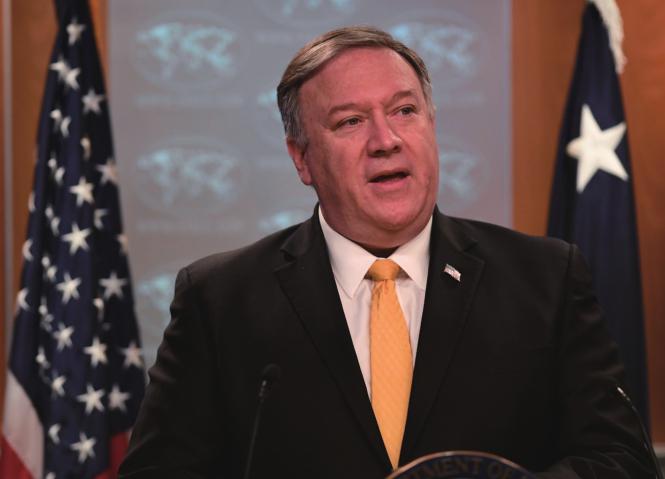Quitting Yet Again
2019-03-10ByWenQing
By Wen Qing
After months of signaling, U.S. Secretary of State Mike Pompeo finally announced on February 1 that the United States was withdrawing from the Intermediate-Range Nuclear Forces (INF) Treaty signed with the former Soviet Union in 1987, effective in six months. The reason he gave was Russias “cheating.”
Russian President Vladimir Putin responded with a tit-for-tat move, announcing that Russia will also pull out of the arms control pact due to U.S. violations.
The mutual recriminations about breaching the treaty, analysts say, indicate further deterioration of Russia-U.S. ties. The unilateral U.S. withdrawal also thwarts global efforts to control nuclear arms and could trigger a new arms race.
A flawed pact
The INF Treaty, signed by U.S. President Ronald Reagan and Mikhail Gorbachev, General Secretary of the Central Committee of the Communist Party of the Soviet Union, led the two countries to agree to destroy all ground-based ballistic and cruise missiles of intermediate (1,000-5,500 km) or short (500-1,000 km) range, and not to produce or deploy such weapons in the future.
It was a major compromise between the U.S. and the Soviet Union, and played a significant role in maintaining security and stability, keeping nuclear missiles off European soil for nearly three decades, Shen Dingli, a professor on arms control at the Shanghai-based Fudan University, said.
However, it had some deficiencies too. For example, the INF Treaty applies to only land-based missiles of intermediate and short range. It does not cover sea-based or air-launched missiles. Moreover, the on-site verification period lasted only 13 years after the treaty came into force and there was no further verification deterrence, Shen pointed out.
Precisely due to such gaps, disputes began to emerge. The U.S. began to claim Russia breached the INF Treaty as early as 2014. Since October 2018, President Donald Trump began threatening to leave the treaty unless Russia complied with its terms. Despite months of negotiations to save the treaty, on January 31, the United States announced that the two countries had failed to reach an agreement and a day later, Pompeo announced the U.S. withdrawal.
Russias response
Shortly after the U.S. withdrawal announcement, Russia followed suit. “Our American partners announced that they are stopping their participation in the treaty, we will also stop. They announced that they are engaging in scientific research and development operations, we will do the same thing,”Russian President Vladimir Putin said on February 2.
Russian Deputy Foreign Minister Sergei Ryabkov said the U.S. was trying to pin its own unilateral breach of the treaty on Russia, which was “unacceptable,” adding that the U.S. move was motivated by self-interest, not anything Russia did.
Russia also blamed the Trump administrations unwillingness to hold “substantial talks” to save the treaty. “Despite the openness of the Russian Defense Ministry to a substantive dialogue on the parties fulfillment of their obligations under the INF Treaty, the United States has not provided any evidence to support their stated position. At the same time, the United States has not taken the required action to eliminate the breach of its own obligations under the treaty,” Russian Defense Ministry spokesperson Major General Igor Konashenkov said on February 7.
Russia has counter-alleged that the U.S. deployment of the MK-41 missile system in Romania violates the INF Treaty. So do the U.S. Aegis Ashore ballistic missile defense system and armed drones, which are technically land-based cruise missiles. It has urged the U.S. to destroy the MK-41 system and associated equipment.
A Pandoras box
Experts say the U.S. pullout from the INF Treaty is another example of Washington discarding international cooperation while pursuing its own interests. “Due to the long-ingrained strategic contradictions between the United States and Russia, the United States is determined to withdraw from the treaty. There is a slim chance of the two countries reaching a deal in six months,” Hong Yuan, a senior researcher on arms control with the Chinese Academy of Social Sciences, told Beijing Review. “The Trump administration would also like to show a tough posture to counter the scandal about Russian interference in the presidential election in 2016.”
During the 1970s, the United States enjoyed advantages in sea and air missiles, compared with its land-based missiles. In contrast, the Soviet Union was more developed in land-based missiles. Thats part of the background of the signing of the INF Treaty, Hong pointed out. However, today“the U.S. is eager to develop its land, sea and air missiles in a more balanced way.” After pulling out of so many international treaties, the Trump administration apparently doesnt mind withdrawing from another.
The unilateral decision has triggered widespread criticism inside the United States itself.
Speaker of the House of Representatives Nancy Pelosi also issued a statement, saying “The Trump administration is risking an arms race and undermining international security and stability.” She suggested the administration “exhaust every diplomatic effort and work closely with North Atlantic Treaty Organization allies over the next six months to avoid thrusting the United States into a dangerous arms competition.”
Former Secretary of State Hillary Clinton claimed the U.S. should deal with the issue through public diplomacy and seek more talks, rather than pulling out. At a recent event hosted by Georgetown Universitys School of Foreign Service and its Institute of Politics and Public Service, Clinton said, the last thing the world needs right now is a nuclear arms race.
In Europe, European Union foreign policy chief Federica Mogherini called on both sides to stick to the treaty minutes before the withdrawal announcement. “What we definitely dont want to see is our continent going back to being a battlefi eld or a place where other super powers confront each other. This belongs to a faraway history,” she said.
German Foreign Minister Heiko Maas said it is important that disarmament and the international arms control architecture are put back on the international agenda. “Without the INF Treaty there will be less security,”Maas said.
But while western European powers such as France and Germany are asking the U.S. to return to the treaty, Eastern Europe may feel differently, Feng Yujun, a professor on Russian studies at Fudan University, said. “Eastern European countries including Poland may feel more threatened by Russia and be more inclined to permit the U.S. to deploy missiles on their soil,” Feng said.
Another grave concern is that the U.S. withdrawal could open a Pandoras box and pose collateral damage to other arms control treaties, such as the new START Treaty, the last remaining arms control agreement between Russia and the United States. Signed in 2010, it restrains both sides to 1,550 nuclear heads over 700 delivery systems. So far, there are no indications as to whe ther the two countries will agree to extend this treaty, which expires in 2021.
“Two major military powers withdrawal from a key arms pact may trigger a new round of military competition, leading to a security dilemma,” Feng said. In such a situation, they would seek to drum up their security by increasing military power and forging alliances, which would lead other states to respond with similar measures.
However, Feng added that there was little chance of a full-fledged arms race between Russia and the United States, as “Russias limited defense budget cannot afford it.”
Some Western countries have suggested including China in the INF Treaty. However, Chinese observers say it is not fair to force China to join the pact since the three countries have different military strength.
“China lags far behind the United States and Russia in the number, quality and capacity of intermediate- and long-range missiles. Chinas conventional intermediaterange missiles are an important defensive means to maintain national security, not attack other countries,” Hong said. Chinas air and naval power are also much weaker in comparison to Russia and the United States.“China is not on the same page with Russia and the United States on this issue,” Hong remarked.
